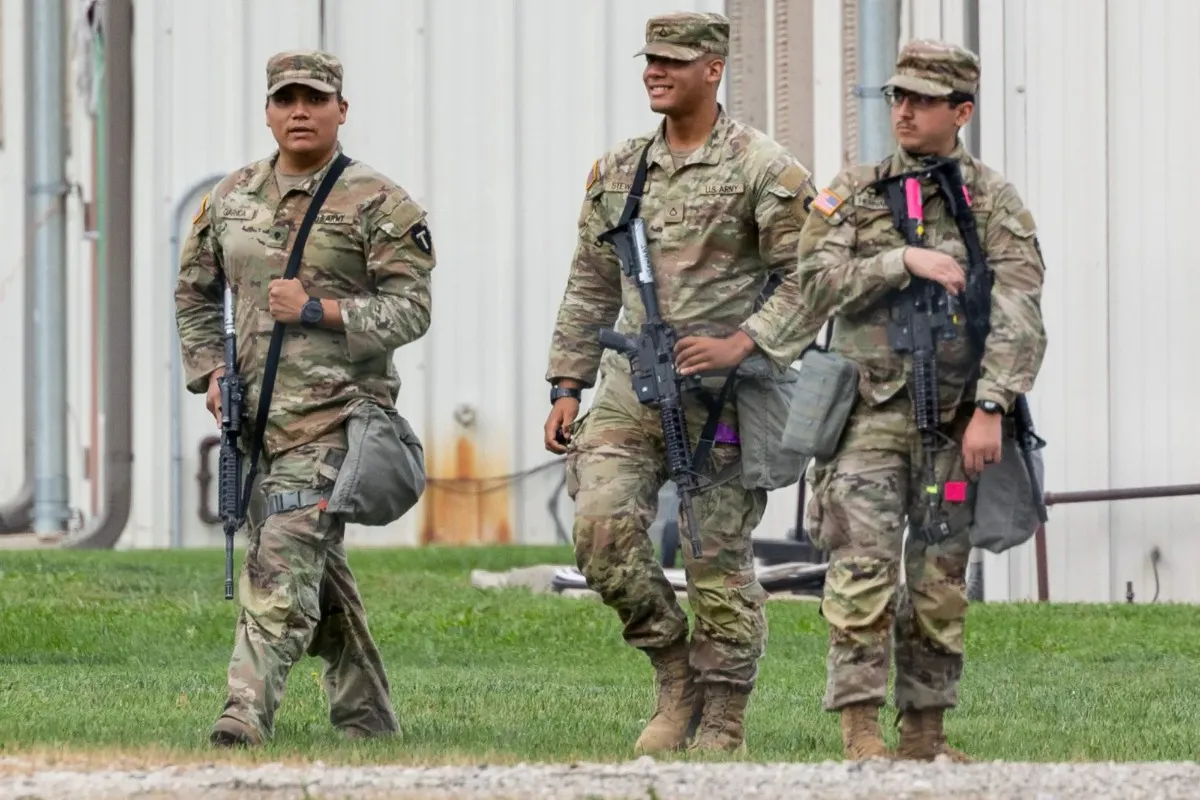![]() Newsflash:
Newsflash:
U.S. tech stocks slide on AI bubble fears10:45 AM
Government Shutdown Halts SNAP Benefits 8:00 AM
UPS Cargo Plane Crash in Kentucky Kills 7 2:45 AM
Democrats Gain in 2025 State Elections 10:00 PM
USPTO Stays Open Amid Federal Shutdown 9:30 AM
US–China Reach Rare-Earth Trade Accord 11:15 AM
Clocks “Fall Back” as Daylight Saving Time Ends 2:00 AM
Federal Government Shutdown Surpasses Historic Milestone12:01 AM
Insurtech Firm to Release Q3 Results 5:00 PM
“Make-or-Break Day” for Millions’ Finances 12:00 AM
SpaceX Prepares for next-icon Starship Launch 10:14 am

Breaking News
![]() Nov 2
Nov 2
by Olivia Bennett
Advocates fear that the government shutdown will have long-term implications on the National Guard
With the U.S. federal government shutdown now in its second month, military advocates say the ripple effects are being felt deeply by the National Guard. Thousands of full-time civilian technicians who serve in uniform have gone unpaid, training programs and maintenance operations have been cancelled, and the Guard’s readiness may suffer long into the future.
The Senate’s passage of a bill to end the government shutdown shifts the spotlight to the House for final approval. Lawmakers aim to restore full federal operations and prevent further disruption to essential public services.
Training Gaps and Operational Delays
The shutdown has hit hard at the core functions of the National Guard: crucial training exercises and maintenance schedules are being postponed or cancelled altogether. According to advocacy groups, “there’s just thousands and thousands of hours” of vehicle and aircraft maintenance that units will have to catch up on when funding resumes.These delays threaten to erode readiness just as the Guard faces heightened deployment demands.
Technicians Unpaid, Morale Suffering
More than 30,000 Guard technicians, who are civilians who also work part-time in uniform, haven't been paid since the shutdown started. personnel claim that these personnel are "very important to getting ready and running our daily operations." Troops and technicians are unhappy because their rates keep going up and there doesn't seem to be an end in sight. This makes it more likely that people will quit. A lot of technicians are having trouble paying for basic needs like housing, child care, and transportation. Some people have to work as civilians for a short time or borrow money to get by. Guard officials are worried that people will leave the Guard if they have money problems for a long time. This would make the Guard less prepared for things that might happen in the future. Advocates want Congress to give emergency money or waivers to keep important workers safe from future shutdowns.
Deployment Strains While Budget Lags
Even if the budget is minimal, the Guard is nonetheless under a lot of stress. More than 2,300 Guard men are patrolling cities in the U.S., such as Washington, D.C. This makes it even tougher to use resources that are already scarce. Some service members are having to wait longer for their discharges and transitions because there isn't enough money to speed up administrative procedures. The officials of the National Guard warn that the extended wait for money is making logistics difficult and is delaying down the delivery of key equipment and maintenance supplies that are needed to keep operations continuing. Units that help with both domestic and international missions, such as responding to disasters and keeping the border safe, are operating with relatively low resources. This means that leaders should put off training and focus on the most vital things they need to do.
The protracted closure has also made it tougher to work with state emergency agencies, which makes it harder to get ready for hurricanes, wildfires, and other natural catastrophes. Some analysts argue that if there are any additional delays, it might be harder for the Guard to respond rapidly to emergencies in either the state or the federal government. Military readiness specialists argue that not having money for a week makes things worse in the long term, especially when it comes to maintaining troops ready, vehicles in good shape, and missions ready. A Guard representative remarked, "You can't just stop national security." "The work goes on even when the checks stop coming.".
"Government Shutdown Sparks Fears of Long-Term Damage to National Guard"
Breaking News
Washington — As the government shutdown continues, advocates warn of lasting damage to the National Guard’s readiness and morale. Thousands of unpaid technicians and suspended training programs are creating what experts call a “silent crisis.” Officials say the funding freeze is disrupting disaster response and could weaken recruitment, deployments, and public confidence nationwide.
Outlook..
If the shutdown continues or repeats in future fiscal years, the National Guard may face systemic vulnerabilities: missed training cycles, equipment degradation, and increased difficulty in recruiting and retaining qualified technicians. Congressional and executive steps could help mitigate those risks — for example, by exempting Guard pay from future appropriations lapses — yet in the absence of long-term structural solutions, the Guard may be left with a readiness shortfall at a time when domestic and global demands are rising.

Olivia Bennett
Olivia Bennett is a U.S. political correspondent reporting on federal policy, election developments, and national governance issues.p>